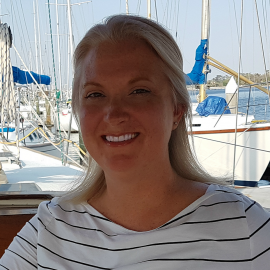 MENU
MENU Buying and owning a boat can be a scary proposition. It’s a big investment, a big commitment and there are many unknowns. But if you can put that fear aside, owning a boat can be the most rewarding experience you will ever have! Here St. Barts Yachts Broker Julie Tijerina tells us about her experience with fear and owning a boat.
I spend a lot of time around boats and their humans. There seems to be a recurring theme that I’ve noticed in the aspiring cruiser set that I’d like to take a swing at: fear.
I read about it in blog posts and Facebook threads. I hear about it in the voices of men and women when showing boats. This unease of making a mistake – be it buying the wrong boat, messing up a repair, cosmetic or mechanical, or even running aground or damaging their boat during docking. So many things people are afraid of! I often think to myself, “Come on! Where’s your sense of adventure?” But the reality is, we are conditioned for fear. It’s programmed into our DNA by our little lizard brains to keep us alive.
This fear of failure keeps so many of us on the sidelines of our lives. As someone that has essentially balled up my life and thrown it away to live on a boat and ultimately go cruising, I’d like to share how I overcome my fears and some of the lessons I continue to benefit from in the process.
As a former yoga teacher, I learned all sorts of cool stuff about the human body.
I found the fight-or-flight response especially interesting and I leverage it every time I take my boat out.
Did you know, for example that during a stress response, your sympathetic nervous system will:
Cool, right?
Because I know this intellectually, I welcome the stress response to the party instead of letting it freak me out and make me throw the helm at my husband. I know that because I am nervous, my bodily systems are colluding to make me extra sharp, focused, and strong. The fear response is not my enemy, and I don’t let the discomfort of it scare me off the captain’s chair. I breathe through it, and talk through the game plan, so I know what I’m doing before I do it. Then…I do the thing.
I’ve failed (well, I consider it “failed” because I came into contact with other things, but very little in the way of damage) twice. Both times were because I didn’t understand how my boat worked, and both times I got a little more educated about how my boat responds, what it takes to move her heavy hull, and how her systems work. I do not give up driving the boat because I made a mistake or two.
There’s a couple of little memes that I see floating around that set my teeth on edge. FEAR: “Face Everything And Rise!” or “False Evidence Appearing Real!”. These acronyms have a sort of “Ta-Daa!” quality to them; skipping over the hard part, bypassing the racing heartbeat, the insecurity, and the inexperience bits and going straight to the finish line. These ideas are too simplistic for my taste and don’t integrate the reality of courage or of the multiple attempts at success most of us make to get there. (Wherever there is.)
I like this better: Fail. Evaluate. Adjust. Reengage. This definition-by-acronym integrates failure and makes failure the first step in a realistic system to overcome fear through experience. It gives you the latitude to screw up, learn, change your methods, and start over. This is how we become competent sailors – by leveraging our mistakes, not dodging them. It gives us the room we need to take our first steps into the unknown by not just allowing failures but welcoming them as part of the process and not something to be avoided at all costs.
Now of course, be sensible. I’m not advocating for a devil-may-care attitude. But, I am advocating for a mentoring type of relationship to new experiences. Experts did not roll out of the crib that way. They learned by making lots of mistakes and correcting course.
F-it. Employ. A. Resource.
If you know you are out of your depth, get a tutor. Ask a more experienced friend to talk you through it. Hire a pro. When we recently moved our boat and were going to have to dock stern-to, I was intimidated by the task, so I asked my friend, Andy Lee, captain and circumnavigator, to advise. Though he claims he didn’t even need to be there, his calm presence made me feel confident at the helm, and the extra set of hands and eyes made the whole exercise anti-climactic. Which is exactly what you want in a docking experience. (For the record, not one of the times I banged into something!)
Phone a friend. Ask the audience. Poll your cruising and boating Facebook groups. Buy a book on provisioning. Get a cruising coach. *GASP* Read the manual! You live in the future, where every thought humanity ever had about anything is accessible with a few keystrokes. I, for one, am tired of learning everything the hard way. I’d say that’s a good marker for reaching maturity. I’ve quit letting my ego get me into trouble by acting like a know-it-all that in fact knows nothing. It’s really okay to learn from other people’s experience and get their help.

In 2016 Julie and her husband left Texas and bought a Whitby 42 to live aboard in Jacksonville, FL. Carey English, their Broker in our Jacksonville location recruited Julie to join the St. Barts Yachts team. As a boat owner herself, Julie knows first hand how to guide you through the process. Don’t wait!